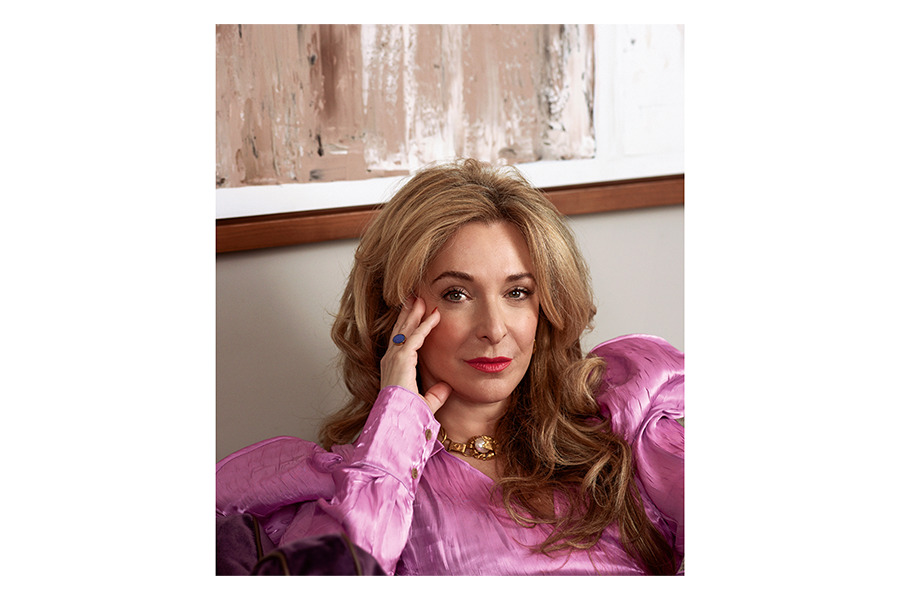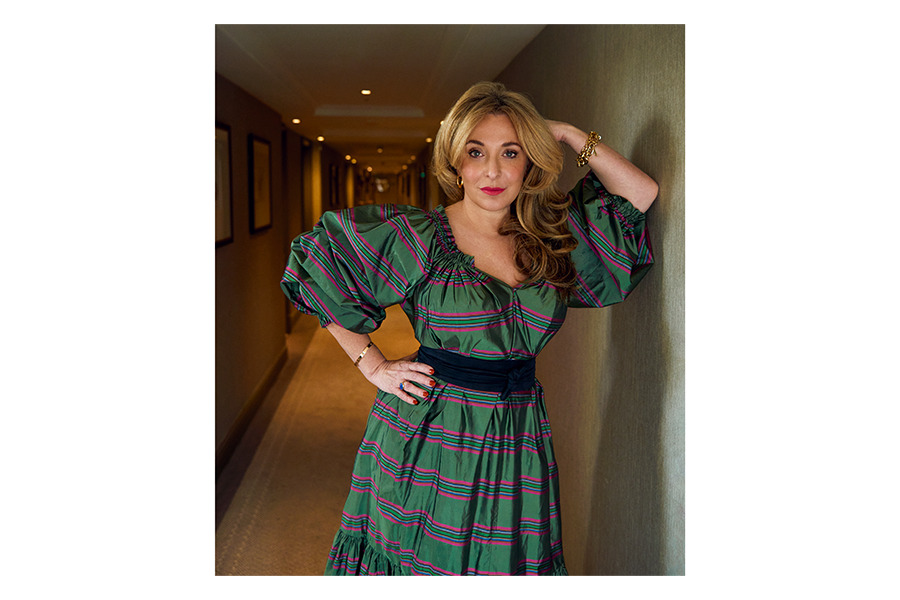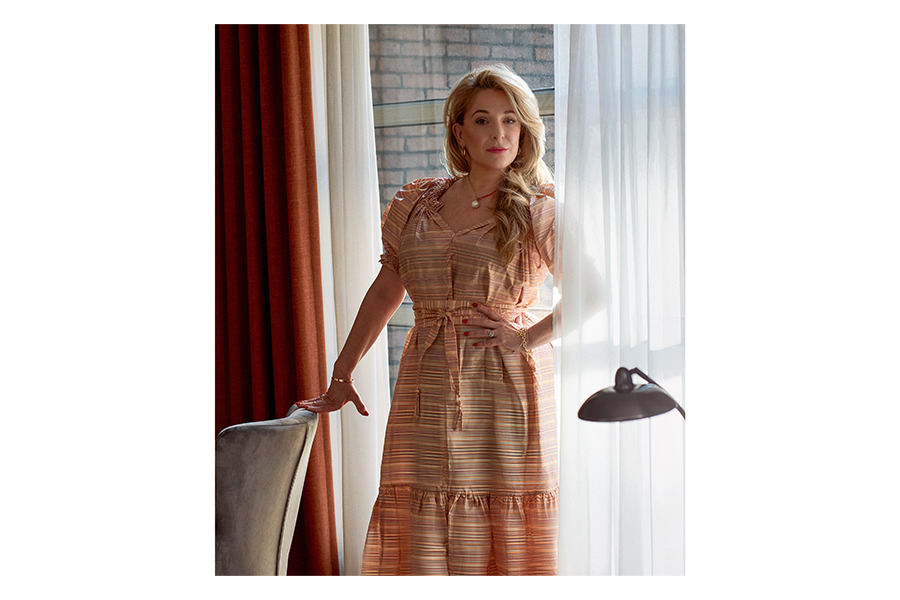It is 1936 and Oswald Mosley’s British Union of Fascists is threatening to march through the Jewish East End. Shylock is a survivor of anti-Semitic pogroms in Russia. A widow, she runs a small business from her tiny, terraced house in Cable Street, working hard to provide a better future for her daughter. When aristocratic antisemite Antonio desperately needs a loan, he makes a dangerous bargain with her – the same woman he has spat on in the street. This is the setting for Tracy-Ann Oberman’s ground-breaking new adaptation of The Merchant of Venice, which sees the Shakespeare classic reframed, placing the action in east London, against a backdrop of rising fascism across Europe and in Britain. The Merchant of Venice 1936 will open at the Watford Palace Theatre at the end of this month, supported by Trafalgar Theatre Productions and the Royal Shakespeare Company. “This was meant to happen the year of Covid; it was going on a big tour. Unfortunately, because of Covid, it got cancelled. And the assumption was that it wouldn’t see the light of day again – as many projects didn’t – but so many people were behind this project and wanted to tell this story, it has been really humbling,” Tracy-Ann tells me when we sit down to talk about the project. “I just cannot believe that this is it! I made a trailer that I put out on social media – and it is exactly what I wanted it to be. And it has whipped up an enormous amount of interest. It feels amazing.”
In the end, it couldn’t have come at a better time, she believes. “I think it is very topical because we are living in a time where extreme politics have brought about a great deal of hatred – there has been a rise in anti-semitism, a rise in racism, and I think that it is in certain peoples’ interests to have minorities at each other’s throats, fighting an oppression Olympics, but actually, we are much stronger together. And prouder together, and we celebrate each other when we work together and protect each other.” Tracy-Ann describes having had a complicated relationship with the play since her first introduction to it. “I first read it at school,” she recalls. “I think I was in year eight or nine and it was a really difficult read. It was a very uncomfortable experience hearing everybody shouting, ‘My ducats, my daughter’ and wringing their hands and doing impressions of Jewish people. When you think that the two archetypes in this country are Fagan and Shylock, they are not very positive role models to have as part of our canon. That was my first experience of it, but I have seen it many times since and never liked it particularly.” Over the years, the desire to reclaim the story and retell it in a way that she felt comfortable with grew. “It was important for me that people understood Shylock,” she explains.

Tracy-Ann wears: dress by Rejina Pyo at Fenwick, necklace by Sonia Petroff
Tracy-Ann’s own experiences of anti-semitism played a big role in her desire to reframe the Shakespeare classic. “There has been a real rise in anti-semitism, both on the left, and the hard right, and I found myself, ly on social media, standing up against it,” she tells me. “And there was such an intersectional experience of misogyny and anti-semitism; I found people like myself and Rachel Riley, Luciana Berger, and the Jewish women who were talking about it, and standing up and saying, ‘This is unacceptable to use these racist tropes’, we were the ones who were getting really horrible, misogynistic responses, whereas the men saying the same things were not.” With this on her mind, and after watching Phyllida Lloyd’s all-female Julius Caesar at the Donmar Warehouse, Tracy-Ann began to wonder how the reading of The Merchant of Venice might change if Shylock was cast as a woman.
The change of setting, meanwhile, was inspired by Tracy-Ann’s own family history. Her great grandmother was a survivor of the anti-semitic pogroms in Russia – Tracy-Ann describes hearing tales of how she nearly saw her father being beheaded by the men of Tsar Nicholas’ Cossack army, and that those same men attempted to rape her. She was consequently sent to Britain in 1907 to work at her aunt’s factory in London. It was on the journey there that she met a young man called Isaac, who was escaping because he was a political activist; she later went on to marry him. “She became very politically active herself,” Tracy-Ann tells me, adding, “I was brought up with stories of her involvement in the Battle of Cable Street.”
This moment in history is one that I am not familiar with, and in that I am not alone, Tracy-Ann reassures me. “This was the other thing that I wanted my play to represent,” she explains. “We know a lot about American civil rights, and what happened there, but we had our own civil rights moment at the Battle of Cable Street, when Oswald Mosley and his Blackshirts, his British Union of Fascists, all dressed up like an army, and marched through the East End of London, flanked and protected by police on horseback. He wanted to stick it to the Jews and bring as many ordinary British people with him as he could,” she tells me. “What he didn’t reckon with was that the immigrant communities who lived there, they stood with their Jewish community, and they said, ‘If you attack one, you attack us all’. The dockers, the Afro Caribbean neighbours, the Irish working class, the English working class… they literally stood together, and they stopped this militia from passing through. And they overturned milk floats, and they linked arms, and my Bubbe, my great grandmother was there, they were all there, linking arms and saying, ‘You shall not pass!’. It was an incredible moment of hope. Because it was about all working-class minorities pulling together to say to a greater evil, we are stronger together, and you cannot divide us. Really, that is the framework of the backing of my Merchant of Venice. It celebrates a political moment of unity, a fight against fascism.”
With this germ of an idea, a conversation at an awards ceremony set the ball rolling to bring Tracy-Ann’s vision to life. “I mentioned this to Brigid Larmour (artistic director and CEO at Watford Palace Theatre) at the Tonic Awards,” she tells me. “The awards are a fantastic, all female celebration of theatre – we are the perfect example of how they can make things happen. She asked me what I wanted to do, and I said that on the back of seeing Julius Caesar, I wanted to know what would happen if you made Shylock into a woman, and you turned her into a tough Jewish matriarch with a single daughter, living in the East End of London, scratching out a living, lending money under the counter. And she loved the idea!”

Tracy-Ann wears: dress by Anna Mason London, shoes by Gina
The pair set to work fitting the original Shakespeare script to their new 1936 setting. “Brigid and I have adapted it, so that it is much shorter – I think often people groan if they are not a Shakespeare lover, because they think that it is going to be really long and boring, but this one absolutely will not be,” Tracy-Ann reveals. “We have been working with our set designer Liz Cook. I have also got the wonderful composer Erran Baron Cohen, who is Sacha’s brother, who did all the music to his films, he is coming in to compose new music for it. So, there are lots of people involved. I think Erran’s grandfather remembers Cable Street and was there – everybody involved, in some way or another, has got a connection to this project, and feels extremely passionately about it.” Tracy-Ann herself will be taking on the role of Shylock. “It is such a personal project to me, it is so much based on my great grandmother, so much based on my family’s memories of the East End and growing up in and around Cable Street in the 1930s, that in a way, I think in this instance I had to play it, because it comes from my heart, and my lived experience,” she tells me, proudly.
And she sincerely hopes that the two-week run in Watford is very much just the beginning for this production. “Trafalgar have absolutely loved it from the start, and they have taken it over. And the RSC have been incredibly supportive and helped us to work with them. So yes, this project will have a much longer life, and an international life as well, I’m hoping,” she exclaims. “What I really love about it is that great intellects like Howard Jacobson and I are talking to audiences all over the country about Shylock and The Merchant of Venice. Anthony Julius, the great lawyer who fought Holocaust denial for Deborah Lipstadt, he has been incredibly helpful, and we are talking around the country about the legal side of the bond that Shylock forms with Antonio. And the Holocaust Education Trust, lots of education charities want to get involved. It has been fantastic – we are getting lots of schools involved. So, for me, it is more than just playing a part, it is more than that. It is a real passion that brings in everything that I do: acting, activism, writing, adapting, all to try to make positive change.”
It is a world away from the role she is currently playing – that of Belinda Blair in Noises Off. “I was doing the tour, and then they wanted to bring it into the West End, for the play’s 40-year anniversary, so we agreed that they would work it out so that I was able to do the initial part of the job – the first four weeks in the West End – and at the same time, I would be able to work on The Merchant of Venice and be rehearsing, and that I would finish in enough time to be really focused on The Merchant of Venice and get that up and running,” she tells me. “So, at night I have been running around, up and down stairs, making people laugh, and then in the day I have been rehearsing and producing this. So, it has really stretched me. I have always tried to have my career like this. I just feel very blessed that I can go from heightened farce and comedy to anti-semitism and Shakespeare and 1936 and doing a project like this.”

Tracy-Ann wears: dress by Anna Mason London, necklace by WALD Berlin
Indeed, her CV could not be more varied. Perhaps best known for playing Chrissie Watts in EastEnders and Auntie Val in Friday Night Dinner, her TV credits also include Doctor Who, Toast of London, Ricky Gervais’ Netflix hit After Life, Russell T Davies’ award-winning Channel 4 series, It’s A Sin, and BBC One anti-fascist thriller Ridley Road. She has extensive theatrical experience, too, including appearing with Kenneth Branagh in David Mamet’s Edmond. And she has appeared in over 400 radio plays, herself writing several well-received plays for Radio 4.
“Oh gosh, it is so difficult to say…” she exclaims, when I ask about the moments that stand out in her career. “Standing on the Olivier stage opposite Kenneth Branagh at the National in a David Mamet play. Walking into the Tardis and working with Cybermen and Daleks, and David Tennent in Doctor Who was another massive thrill, because I had always been such a Doctor Who nerd as a kid. Hearing my first play go out on Radio 4. Getting Kenneth Branagh to be in my last radio play. Getting nominated for an award for that. So many…” she begins to tick off highlights.
“Standing with John Malkovich in Lisbon, having been called up at the last minute to go and work on a film with him at the Opera House – that was a pinch me moment. Just all of it really. Also, things like Friday Night Dinner – going in for one episode, and still doing it years later. That was a real privilege, and people loving, loving, loving that series, and loving Auntie Val. That was a huge pleasure. There’s so much,” she continues, enthusiastically. “I loved being in EastEnders. Murdering Dirty Den and burying him under the Queen Vic was great, but I could see that being in a soap for a very long time, you end up doing the same scene and the same character over and over again. And to me, that wasn’t why I went into acting. For me it is about having lots of different creative outlets. And for me, as I get older, I feel so blessed and lucky that it is just getting better and better. I feel so much that I am really fulfilled and in control and I am able to initiate projects. And I am hoping that things just keep going like this.”
If the start of this year is anything to go by, the trajectory looks fixed – alongside Noises Off and The Merchant of Venice 1936, Tracy-Ann is working on a new writing project. “I am writing a one-hour radio play about Mae West at the moment,” she reveals. “About how she smashed the glass ceiling. She was the Madonna, before Madonna, Ru Paul before Ru Paul, Miley Cyrus before Miley Cyrus… she really was the original feminist icon in the 1920s. So, I am writing a play about her choosing to go to prison for writing a play called Sex rather than take it off. She was totally amazing.”
How does Tracy-Ann find the time to fit in all this work, I ask. “Gosh, tell me about it!” She exclaims. “I do find time, but at the moment my head is so full of my other two projects that I am really having to discipline myself when it comes to writing. Plus, trying to be a good mummy. And a good wife, and a good daughter,” she laughs. “It does take some time management. But I enjoy doing it. If I didn’t what would be the point? I absolutely love all of it.”
With so much going on, I wonder if there are any unfilled ambitions. “I would love to appear in something as amazing as White Lotus,” she exclaims, after a moment’s thought. “I am obsessed. It is the right level of humour. It is the Chekov of the small screen. Something like that, that has the glamour and the biting social humour, and understanding of the human spirit. Yeah, a project like White Lotus would be the dream.” We’ll be watching this space.
The Merchant of Venice 1936 runs from 27 February to 11 March (watfordpalacetheatre.co.uk)